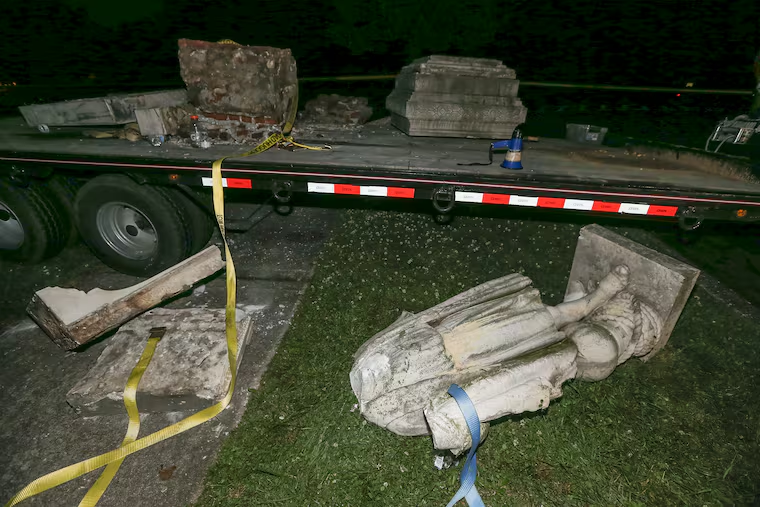Christopher Columbus statue in Camden taken down, but pieces being held in protest by residents
The Rev. Levi Coombs III, pastor of the nearby First Refuge Progressive Baptist Church, said he and about 30 other residents were guarding what remains of the statue.

City workers on Thursday afternoon took down a statue of Christopher Columbus at Farnham Park in Camden, but residents who support its removal have taken possession of its pieces in an ongoing protest as statues of the explorer are targeted nationwide over his brutal treatment of native people.
Video shot from the Fox29 helicopter showed workers with parts of the Camden statue loaded onto a flatbed trailer behind a large city truck. There was a small crowd of people gathered, including one person who appeared to be speaking through a bullhorn.
The Rev. Levi Coombs III, a leading proponent of getting rid of the statue and pastor of the nearby First Refuge Progressive Baptist Church, said he and about 30 other residents were guarding what remains of the statue at the park.
» READ MORE: 8 days of Philadelphia protest: How George Floyd changed a city 1,100 miles away
Coombs said residents had called for the statue’s removal for 40 years but were ignored until this week, when it became a national issue as other statues of Columbus have been removed as part of ongoing protests against racism.
Coombs said he had been assured by Camden County officials that the statue would remain until Saturday, when he planned to lead a march through the city to the statue. He said he found out Thursday afternoon that the city had suddenly taken steps to remove it without telling him or other residents. He blamed that on Camden Mayor Frank Moran.
In an address aired on Facebook Live on Friday, Moran said that as the son of parents born and raised in Puerto Rico, he knew it was time to remove the statue.
“There were a lot of atrocities toward the human beings that were on the island of Puerto Rico and other Caribbean islands by this individual, and I believe [the statue] is and was offensive to all people of color, whether black or brown,” Moran said. “And I, as mayor of the City of Camden, made the decision to take this statue down.”
Moran said he intends to open a dialogue with the community on how to repurpose that area in the park.
» READ MORE: Should Philadelphia say 'Goodbye, Columbus?'
» READ MORE: Protests prompt U.S. leaders to remove Confederate monuments
City spokesperson Vincent Basura said he was aware from TV reports that residents had appeared at the park to block workers from taking the statue away.
What remains of the statue eventually will be put into storage, Basura said.
Coombs said the city’s workers had left the park and the residents would guard the statue’s pieces until Saturday.
The statue is inscribed with the year 1915, which is believed to be when it was dedicated, Basura said.
The City of Camden late Thursday afternoon issued a statement that read in part: “Previously there have been requests to remove the statue as the community no longer supports the monument. It is long overdue, but we must now establish a plan to reexamine these outdated symbols of racial division and injustices.”
The statue isn’t the only local Columbus memorial to be removed. Wilmington announced on Friday it is taking down statues of Columbus and Caesar Rodney, a signer of the Declaration of Independence whose name adorns schools and parks, and is featured on the state’s quarter.
In a statement, the city said the statues were being removed and stored to allow “overdue discussion” about the public display of historical figures and events. They also cited social media posts indicating the statues were being targeted by protesters.
“We cannot erase history, as painful as it may be, but we can certainly discuss history with each other and determine together what we value and what we feel is appropriate to memorialize,” Wilmington Mayor Mike Purzycki said in a statement.
In Philadelphia, there are two Columbus monuments — a statue in Marconi Plaza in South Philadelphia and a 125-foot obelisk at Penn’s Landing. So far, neither has been targeted by demonstrators. A 1992 ordinance renamed part of Delaware Avenue “Christopher Columbus Boulevard” to coincide with the 500th anniversary of his arrival in the New World.
» READ MORE: Schools grapple with how to teach Christopher Columbus' legacy
“You have to understand what an insult it is to the Indian people,” George Hines, a Native American, told The Inquirer in 1992. “It would be like telling the Jewish people that you were going to honor Adolf Hitler.”